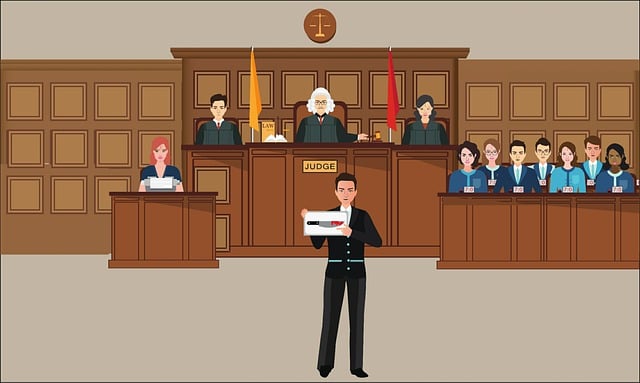Defendants facing antitrust charges in criminal law must choose between a plea bargain and trial. Plea bargains offer speed and reduced penalties but can raise suspicions of manipulation. Trials provide a full defense presentation but are lengthy, expensive, and unpredictable. Strategic considerations balance immediate benefits against long-term effects on reputation. Historic cases like United States v. Microsoft shape the landscape, with many complex cases proceeding to jury trials.
In the intricate world of criminal law, antitrust violation cases present unique challenges. This article explores the multifaceted aspects of these trials, from understanding foundational antitrust laws and their purpose to dissecting the strategic interplay between plea bargaining and trial. We weigh the pros and cons of each approach, delve into defense strategies, and examine historical cases that continue to shape contemporary antitrust litigation, offering insights into navigating this complex domain.
- Understanding Antitrust Laws and Their Purpose
- When Plea Bargaining Becomes Suspicious
- The Pros and Cons of Going to Trial
- Strategies for Defending Against Accusations
- Historical Cases Shaping Antitrust Litigation Today
Understanding Antitrust Laws and Their Purpose

Antitrust laws are designed to promote fair competition and prevent monopolies from controlling markets. These laws aim to ensure that businesses operate within ethical boundaries, fostering a level playing field for all competitors. The primary purpose is to protect consumers by maintaining market diversity and keeping prices competitive. In the event of an alleged antitrust violation, corporate and individual clients alike face significant consequences. One crucial aspect to consider is the choice between a plea bargain and going to trial in criminal law.
Across the country, high-stakes cases often involve complex negotiations where defendants must weigh the benefits of a plea bargain against the potential risks of a full trial. Plea bargains allow for reduced charges or sentences in exchange for a guilty plea, while trials offer the chance to present defenses and potentially clear one’s name. The decision is especially critical in antitrust violations, as the outcome can determine the future of businesses and their leaders.
When Plea Bargaining Becomes Suspicious

In criminal law, the choice between a plea bargain and trial is a crucial decision for defendants facing antitrust violation charges. While a plea bargain can offer a more predictable outcome, it may also raise suspicions if strategically manipulated. Prosecutors often use plea deals as a tool to gain cooperation from individuals involved in complex white-collar defense cases, which can lead to significant revelations. However, when the terms seem overly favorable or inconsistent with the evidence, it raises questions about potential collusion and undermines the integrity of the justice system.
This strategy is particularly notable in high-stakes cases where defendants might face severe consequences. For his clients, a well-crafted defense strategy should consider both the immediate benefits of a plea bargain and the long-term impact on their reputation and future opportunities. Navigating these complex scenarios requires a nuanced approach, ensuring that justice is served without sacrificing fairness or due process.
The Pros and Cons of Going to Trial

Going to trial in antitrust violation cases comes with both advantages and drawbacks. One benefit is that it allows for a thorough examination of evidence and arguments, providing a transparent and fair outcome. This is particularly important in complex white-collar and economic crimes, where subtle nuances can significantly impact the case’s result. Additionally, a trial offers an opportunity for defendants to present their side of the story directly to a judge or jury, which can be crucial in high-stakes cases with significant financial implications.
However, trials also come with considerable risks. They are often lengthy and expensive, straining resources and potentially damaging reputations. The process can be unpredictable, with outcomes depending on the strength of arguments, witness testimonies, and legal strategies. For his clients, a trial might not always yield the desired result, even with strong defenses. Therefore, a well-considered strategy, including evaluating the pros and cons of a plea bargain versus trial, is essential in navigating these complex cases.
Strategies for Defending Against Accusations

When facing accusations of antitrust violations, a key strategic decision is whether to accept a plea bargain or proceed to trial in criminal law. In many cases, companies and individuals opt for a plea bargain as it offers several advantages. This approach allows for a quicker resolution, potential reduced charges, and may result in less severe penalties compared to a trial outcome. Plea bargains are particularly appealing in high-stakes cases involving complex white-collar and economic crimes, where securing a winning challenging defense verdict can be arduous and time-consuming.
However, going to trial provides an opportunity for a full presentation of the defendant’s case. This strategy may be beneficial if there is strong evidence supporting their position or if they wish to set a precedent by challenging the accusations in court. It requires meticulous preparation, thorough legal arguments, and a compelling narrative to achieve winning challenging defense verdicts, especially given the intricate nature of antitrust laws and their interpretations.
Historical Cases Shaping Antitrust Litigation Today

The landscape of antitrust litigation has been shaped by historical cases that still resonate today. One notable example is the United States v. Microsoft case in the 1990s, which led to significant changes in how technology companies operate and compete. This landmark ruling underscored the importance of maintaining a fair market environment, setting precedents for future investigations. Another influential case was Atlantic City Bus Co. v. New York, which highlighted the need to prevent price-fixing schemes and monopoly formation, especially in transportation sectors across the country.
These historical cases have direct implications for modern antitrust litigation strategies. While some violations may lead to plea bargains to avoid indictment, many complex cases still proceed to jury trials, offering a chance for extensive examination of evidence and legal arguments. This balance between negotiation and trial ensures that justice is served, fostering transparency and accountability in business practices. The lessons from these past struggles continue to guide modern efforts to protect fair competition, ensuring that companies operate within ethical and legal boundaries.
In navigating antitrust violation cases, understanding the nuances between plea bargaining and going to trial is crucial. While plea bargaining can offer a quicker resolution, it may not always protect against potential consequences. On the other hand, proceeding to trial provides an opportunity for a comprehensive defense but comes with its own complexities. This article has explored various strategies, historical cases, and the balance between these two paths in criminal law, highlighting the importance of informed decision-making for all involved. In light of these discussions, choosing the right course of action depends on the specific circumstances, ensuring the best possible outcome in antitrust litigation. Remember that, in this dynamic legal landscape, knowledge is power.






